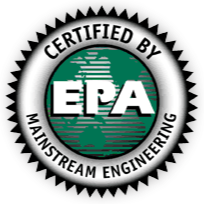AC freon leaks: “what’s that?” Freon is actually a trademarked product of The Chemours Company, and can be generically described as gasses or liquids that are used as refrigerants, working to cool your fridge, car, and most importantly, your home. For various reasons, freon type products, aka refrigerants, can begin to leak causing performance and efficiency issues within your air conditioning system. While it’s one of the most common issues your air conditioner might experience, it ‘s something you want to let the professionals handle every time.
Are AC Freon Leaks Harmful?
While Freon is usually not something we come into contact with, it can still be harmful when leaked. Freon is a toxic substance that can cause headaches, dizziness, and even severe breathing problems in those with asthma or respiratory issues.
Even limited contact with freon can be mildly harmful, and can cut off oxygen to the lungs if inhaled deeply. If there is a Freon leak in your home, children and pets should be kept well away from the area, and you should call your local heating and air contractor: Climatech of Professional Air. ac freon leaks
What Causes AC Freon Leaks?
Freon can begin to leak over time due to various reasons:
- Corrosion or material defects.
- Factory defects
- An improperly installed system
- Damage to your system
Freon doesn’t get “used” or go “low” over time.
That’s right, the common misconception that freon is consumed by the system over time isn’t true. Freon works in a “pressurized closed-loop,” meaning that no Freon should exit the system when everything is in proper working-order. ac freon leaks
The 4 Reasons Your Air Conditioning System Is Leaking Refrigerant
1. Improper Installation
Not all HVAC companies are the same. Sometimes, unprofessional installations can lead to immediate freon leaks. Finding licensed and insured HVAC professionals, like those at Climatech of Professional Air, is your best bet at having your system installed right the first time. While other companies may save you money in the short run, going with licensed and insured experienced technicians will ultimately save you the most money overall. ac freon leaks
2. Defective Parts
It’s rare, but sometimes the parts provided by the air conditioning system manufacturer are defective, and unfortunately, in most cases this isn’t known until the part is installed and tested. When dealing with a professional HVAC company, parts and repairs usually come with a warranty. At Climatech, we know how important a properly running HVAC system is, especially in the Florida heat. When your unit is malfunctioning or underperforming, you can trust us to come out and get the job done right the first time.
3. Corrosion
The outside of your air conditioning system is exposed to moisture, sand, and salt in Pensacola. Our environment can corrode metal surfaces quickly. When copper refrigerant coils begin to rust, refrigerant chemicals can escape into the atmosphere through the rusted and corroded areas. The loss of freon causes cooling power to decrease and can eventually lead to compressor burnout caused by overheating.
Luckily, because of our location, we’re experienced in mold prevention, moisture control, and rapid repair services specifically for this situation. Our systems are even built stronger than others to defend against sand, salt, and humidity.
4. Damage
If your unit has experienced damage, secondhand effects can cause other components, including your freon lines, to fail. Keep lawnmower and weed whackers away from the outdoor unit, remove large limbs hanging over the system, and if your outdoor unit is damaged by extreme weather conditions, call Climatech of Professional Air.
5 Signs Your Freon Is Leaking
Although freon gas is invisible to our eyes, other signs can indicate a freon leak in your air conditioning system. If you notice these signs, call an air conditioning expert.
1. Loss In Cooling Power
One of the more apparent signs of a loss of freon is warmer room temperatures. If your air conditioner is taking longer than usual to cool your home, you may have a freon leak. Without the proper amount of freon, the system will struggle to remove warm air from your home.
2. Frozen Air Conditioner System
When your cooling system isn’t working correctly, the evaporator loses its ability to absorb heat. If this is happening, it should indicate low levels of refrigerant. If you see ice or frost on your air conditioning system, that means the refrigerant is leaking.
3. Increased Energy Bills
Due to the decreased ability to remove heat, the system will have to work harder to cool your home, resulting in higher energy bills.
4. Hissing Noises
You may not notice a hissing sound initially, but if you notice this noise upon inspecting your air conditioning system, call your AC repair contractor immediately.
5. Weird Smells
Not all freon smells the same, but many of them have an unpleasant smell that can be harmful when inhaled. Some freon can be easily identified because of the chemical smell, but others may be more difficult to notice because they will be odorless.
Do You Have A Refrigerant Leak?
If you suspect a Freon leak in your home, it is always best to have a professional investigate the situation. Our industry-leading HVAC experts at Climatech of Professional Air can fix the leak before it further affects your health and budget. ac freon leaks
Learn More
Act quickly to protect your health and your wallet if you suspect a Freon or refrigerant leak. Contact Climatech today. Our professional staff can answer any questions you might have and keep you and your family safe from the adverse health effects of leaking Freon.
You may call us at 850-857-4700 or email us at [email protected]. Be sure to follow us on Facebook and Instagram!












